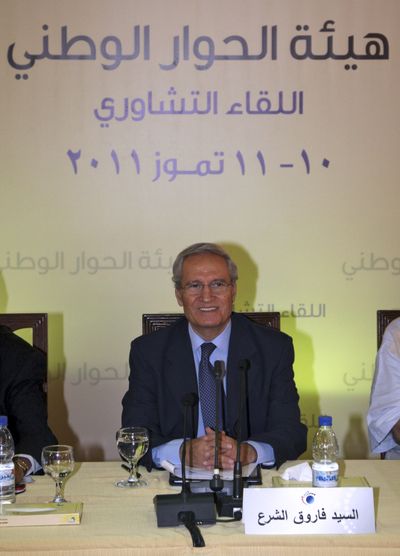Syrian vice president calls for democracy
He says protests forced regime to consider reforms

BEIRUT – Syria’s vice president on Sunday called for a transition to democracy in a country ruled for four decades by an authoritarian family dynasty, crediting mass protests with forcing the regime to consider reforms while also warning against further demonstrations.
Vice President Farouk al-Sharaa spoke at a national dialogue that opened Sunday, with some critics of the government in attendance. However, key opposition figures driving the four-month-old uprising boycotted the meeting, saying they refuse to talk until a deadly crackdown on protesters ends.
“I hope that we will reach … transition to a pluralistic democratic state that enjoys equality for all citizens who participate in forming their own shining future,” al-Sharaa said at the start of two days of talks in the capital, Damascus.
His comments highlighted the extent to which the uprising has shaken President Bashar Assad, who inherited power from his father in 2000. While Assad himself has acknowledged the need for reforms in recent weeks, the high-level call for multiparty democracy was remarkable.
Still, al-Sharaa also made thinly veiled threats against the protesters and suggested some received direction from abroad.
Some 1,600 civilians and 350 members of security forces have been killed since demonstrations began, activists say.
Senior opposition figures and activists driving some protests boycotted the meeting.
“They are blockading (restive) cities and killing demonstrators, arresting people and torturing people to death,” said Omar Idilbi, a spokesman for a loose network of anti-government activists.
“That cannot create a good environment for dialogue.”
Al-Sharaa acknowledged that the promise of reforms would not have come without the uprising.
“It must be recognized, that without the blood sacrificed by civilians and soldiers … this national dialogue would not have been held, at this high level of supervision, under the lens of cameras,” he said.
In a rare acknowledgment of the regime’s mistakes, al-Sharaa said demonstrations were triggered by “a great deal of mistakes … that we swept under our carpets, without thinking deeply about the upcoming days.”